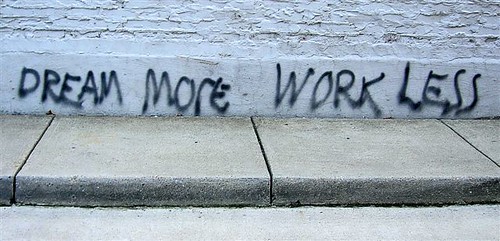In
October 2008 I wrote a post about the
Linden Lab changes to the Open Space sim policies and pricing. At that time there was
JIRA fury (this remains the most-voted issue on JIRA by an order of magnitude), blog posts, open letters,
flickr groups,
berets, protests and micro-hysteria about the changes to the Second Life Ecosystem. The post was about how closely Linden Lab was emulating John Sutter and his fateful demise.
Based on my observations at the time, I was convinced that the highest risk to Second Life was a rampant and deep misunderstanding of the cultural tenants of Second Life and a wholesale disregard for the gifts the Lab had been bestowed - a healthy, passionate, engaged consumer base the likes of which most "beta" companies only dream about.
Since then, my time in Second Life has moved from blissful experiential to ethnographic in nature. I find myself acutely aware of things such as policy changes, customer support, as well as search and affiliate marketing. There are nuggets of insight buried within each of these.
I think a lot about
strategy and entertain my gray matter with
Gedanken exercises to see if I can understand what Linden Lab might be thinking but I also pay equal attention to their
direct actions and interactions with current Residents.
Based on recent observations - the
development of Viewer 2.0 with its
epically failed search, the events unfolding with the
open source community and third party developers,
the poor customer support, the
unannounced release of a new Terms of Service combined with the Policy on Third-Party Viewers and the recently outspoken T Linden, I am equally convinced of what I wrote over a year ago.
This in fact, is the crux of Linden's on-going problem. They are grokless, generally lacking so much of an inkling of their resident base, their passions, their normally predictably irrational behavior. They continue to miss the obvious, launching missiles at unarmed nations, killing off their own tin soldiers in an on-going series of blundering friendly fire.
This general lack of awareness will be the demise of the virtual world of Second Life, not some up-and-comer in the virtual world space, but Linden Lab will in fact run themselves out of business because they have not, or can not, tap into the richness of their standing army of residents.
The challenge of crossing the chasm and cashing in on a gold rush is having
actionable insights.
Actionable insight has two parts:
1) tangible data of which I believe the Lab has
more than plenty,
and what's equally if not more important:
2) the SL Resident "
Grok Factor" (from Oxford grok: "to understand intuitively or by empathy; to establish
rapport with" ) of which they
appear to have so little.
I emphasized the word
appear because of all people I would have guessed that Mark Kingdon, (M Linden) might understand this very notion because
in 2005 he wrote this for ClickZ:
When a company thinks about how to present its brand online (whatever interactive medium it chooses), it must start with a clear understanding of the problem it's solving. Then it needs to dig into its target user's needs, wants, desires, and behaviors. They'll move beyond understanding the customer to having empathy for her.
Dictionary.com defines empathy as the "identification with and understanding of another's situation, feelings, and motives." Understanding is a rational activity; empathy is an emotional one. It's not just about listening or seeing, it's about touching, feeling, and experiencing. With empathy, an experience designer can create something truly exceptional. True empathy is what separates ordinary experiences from exceptional ones.
The $17 billion spent globally on getting smart about customers doesn't buy empathy. Sure, it provides critical facts, figures, and insights about the target. It's a very necessary starting point. But true empathy is earned. How can you build empathy for your target?
- Live their lives. Visit their homes, read their magazines, eat their food, and drive their cars.
- Feel their feelings. Imagine their challenges in life; figure out what gives them joy.
- Find their motives. Understand their online behaviors and actions: What motivates them? What are they looking for in the experience?
Let me repeat and emphasize one part of that extract.
But true empathy is earned.
Mark, I agree with you completely. But this is precisely where I am stuck with the Lab. You seem to have no grok factor; your earnings are low.
You don't grok by analyzing numbers, or from an academic treatment, or from exchanging rafts of email. You grok by living, feeling and finding via
appreciative inquiry. Appreciative Inquiry is a particular way of asking questions and envisioning the future that fosters positive relationships and builds on the basic goodness in a person, a situation, or an organization. In so doing, it enhances a system's capacity for collaboration and change. Appreciative inquiry would have been a great way to pursue the recent Terms of Service and Third Party Viewer Policy changes.
I believe Residents of your Second Life ecosystem are ready for change despite the "no one likes change" mantra, but critical collaboration and change requires understanding where you are (data) as well as understanding and appreciating who and how you are (the Grok Factor) in order to move forward.
John Sutter, despite being a brilliant business man, didn't understand this and his fate is well documented. You know it; right now is the time to start living it.
Please raise your Grok Factor.
The following is the rest of my initial 2008 post about John Sutter, much of which stands today.
Linden has (had?) captured that which most fledgling businesses only dream. No, it's not Electric Sheep. I'm referring to a
passionate consumer base that is willing to pay shockingly large sums of real cash on a regular basis. We used to call those "subscriptions" but since that's become a forbidden word in the new media vernacular, we pretend like paying tier for virtual land is somehow akin to an investment. In some cases it is an investment, but for the most part it's a payment for the privilege of access to content.
So let's review what Linden has at their disposal: paying, passionate and prolific content consumers and creators. Isn't that the equivalent of Social Media Nirvana?
What is that you say?
Linden Lab is a virtual world builder, not a Social Media company! Oh, that would explain it. Everyone knows there are few easy and vibrant Social Media business models; there's far more gold in those virtual hills!
But we know the end-game here, it is the very same that plagued the California gold rushers intent to find fortune among limited resources.
But who profited from the gold rush? Anyone that could leverage the irrationality of those seeking fortune profited mightily. Prostitutes made a healthy wage, as did general store owners, saloons and bankers. However, very few of the one(s) that discovered gold.
I liken Linden Lab to John Sutter. You remember Sutter, right? John Sutter was a
wealthy land developer and it was at his mill where James Marshall first discovered gold in 1848. Now Sutter could not immediately profit from the discovery, since he didn't own the mineral rights on the land on which the gold was found. Those rights still belonged to the Culluma Indians and while
Sutter fought a losing battle to keep interloping miners off his mill site and obtain the mineral rights, the gold rush boomed and busted and the once wealthy land developer died a poor man. To summarize:
Instead of becoming a wealthy man from the precious gold that was discovered at his mill, Sutter's domain was ruined when the Gold Rush hit. His employees deserted the Fort for riches in the foothills, leaving crops to rot in the field and abandoning businesses. He was swindled by unscrupulous partners. His cattle wandered off or were slaughtered by hungry miners, and squatters took over much of his land. He went broke and ended up near Washington, D.C., trying to convince the government to reimburse him for his losses caused by the Gold Rush. His attempts for compensation failed, and he ironically died a poor man in Pennsylvania. Source
Does this sound vaguely familiar? John Sutter - a man of resources, wealth and business savvy -
missed the largest opportunity afforded to him because he lost sight of what was right in front of him. Why? Because
he tried to protect his current thinking, his ownership, his existing business model
instead of adapting to the situation that was rather difficult to ignore.
Sutter was a real estate developer. Did he erect the boom towns? No.
He had farms, cattle and labor. Did he feed or supply the miners? No.
John Sutter put his time, attention and wealth of resources into that which he was comfortable, and as a result he missed the gold rush, quite possibly the largest financial opportunity for which he was uniquely qualified to leverage.
Ironic, isn't it?
M Linden, meet John Sutter.
Share Some Grace:




